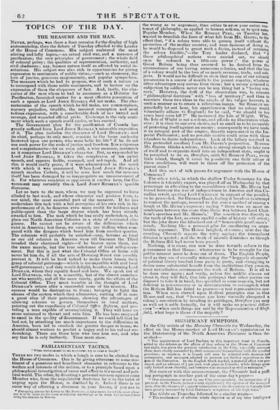PARLIAMENTARY TACTICS.
"When embarrassed Mr an argument, try to raise a laugh."
THERE are two modes in which a laugh is sure to be elicited from the House of Commons. One is by giving utterance to some sen- timent of a generous and beneficent character in reference to the welfare and interests of the million, or to a principle based upon a philosophical investigation of cause and effect in the moral and poli- tical world. The other, by directing'a personal sarcasm against some Member who, from the unpalatable doctrines he is in the habit of urging upon the House, is disliked by it. Indeed there is no surer way of effecting a diversion in your favour, if you are in • Excepting always his Letter to Mr. llowt.avi a false move. fir which great allow- nee is to be made ou the score of deficient knowledge as to what had oecuired here ming his absence in Russia. the wrong as to argument, than either to avow your entire con- tempt of philosophy, as applied to human actions, or to quiz some Popular Member. When Sir ROBERT PEEL, on Tuesday last, wanted to demolish the force of what fell from Mr. GROTE, to the effect that, " if a colony were able to govern itself without the protection of the mother country, and were desirous of doing so, he would be disposed to grant such a desire, instead of retaining the colony forcibly,"—the Tory leader declared, that "if these philosophical notions were carried out, we should soon be reduced to a fifth-rate power :" the power of Great Britain being thus assumed to be derived from the circumstance of our having numerous colonies, and that the loss of a colony would be the loss of' so much revenue, trade, and sub-
jects. It would not be difficult to show that no one of our colonial possessions is a source of wealth to the parent country, whatever other advantages may accrue from them ; but a colony retained in subjection by soldiers never can be any thing but a " losing con• cern." However, the drift of the observation was, to connect "philosophical doctrines" with " loss of territory ;" and thus to
associate these two ideas in the minds of his vulgar hearers, in such a manner as to create a ridiculous image. Sir ROBERT un-
guardedly let out here, his apprehension that no colony would
voluntarily adhere to England ; for he F "we should in ten
years have none left !" He instanced the Isle of' Wight. Why, the Isle of Wight is not a colony, and affords no illustration what- ever: it is close to our own shores, and so small as to be incapable of protecting itself against an enemy: consequently we have made it an integral part of the empire, directly represented in the Im- perial Parliament ; and no possible motive could arise with those islanders to desire independence. Look at the fallacy involved in
this pretended corollary from Mr. GROTE'S proposition. Because Mr. GROTE thinks a colony, which is strong enough to take care of itself and to organize itself into an independent state, ought to be permitted to do so, Therefore, saith Sir ROBERT PEEL, every little island, though it never by possibility can fulfil either of these conditions, will want to throw off the protection of the parent state !
And this sort of talk passes for argument with the House of Commons !
The oth:•r trick, in which the shallow Under Secretary for the Colonies is tolerably expert, was played off on Wednesday by that
personage in adverting to the resemblance which Mr. Hume had
traced between the war of independence in America and this Ca- ; nadian revolt, quoting Lord CHATHAM in support of the parallel, as lie proceeded. Sir GEORGE GREY, feeling it hopeless to attempt
to contest the analogy, resorted to the easier method of raising a laugh at Mr. Hums's expense ; saying " there was no more re- semblance between the cases than there was between Lord Chat- , ham's speeches and Mr. Hume's." The assertion was directly in the teeth of the feet, as every candid reader of history will attest; but the joke drove the falsehood out of " honourable gentlemen's" minds. Nothing like a personal gibe for smothering an unpa- latable argument. The House laughed, of course; next day the
crawling Chronicle repeats the witty saying; the triumphant division is quoted ; and the work of misrule flourishes as though the Reform Bill had never been passed.
Nothing, it is clear, can now be done towards reform in the government in that House: whatsoever is to be wrought for the public interest must be done out of doors. The English People,
tired as they are of eternality witnessing the " beggarly elements" of political liberty bandied front party to party, and struggling to derive some substantial benefit from the institutions they possess,
must nevertheless recommence the work of Reform. It is all to be done over again ; and verily, unless the middle classes set
ubout it, they will find, (too late perhaps,) that other parties are I disposed to take it in hand, less fpitlifled in some respects, but not deficient in perseverance or in determination to accomplish what
the Reform Bill has failed to procure—a real representative sys-
tem. When men elected upon Radical principles rise in that House and say, that. "because you have virtually abrogated a colony's constitution by invading its privileges, therefore you may as well set it aside formally, for it will make no practical differ- ence "—when such things are said by the Representative of Shef- field, what hope is there of the majority ?


























 Previous page
Previous page